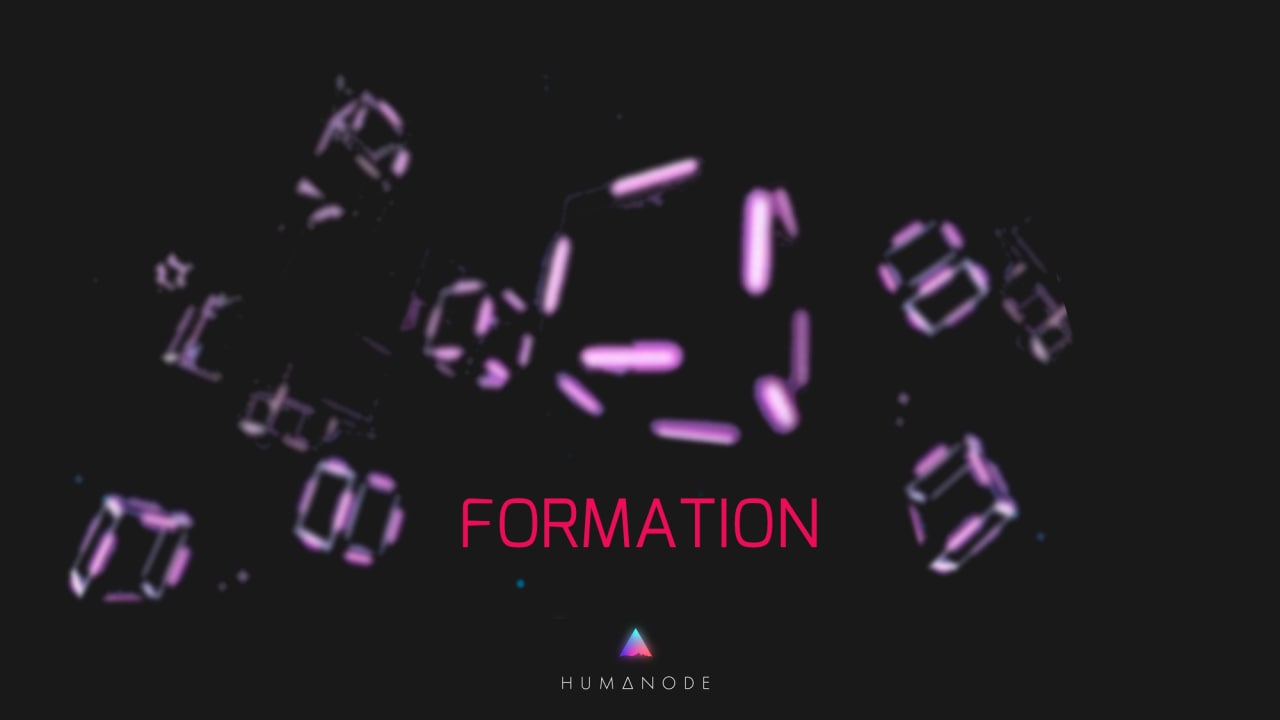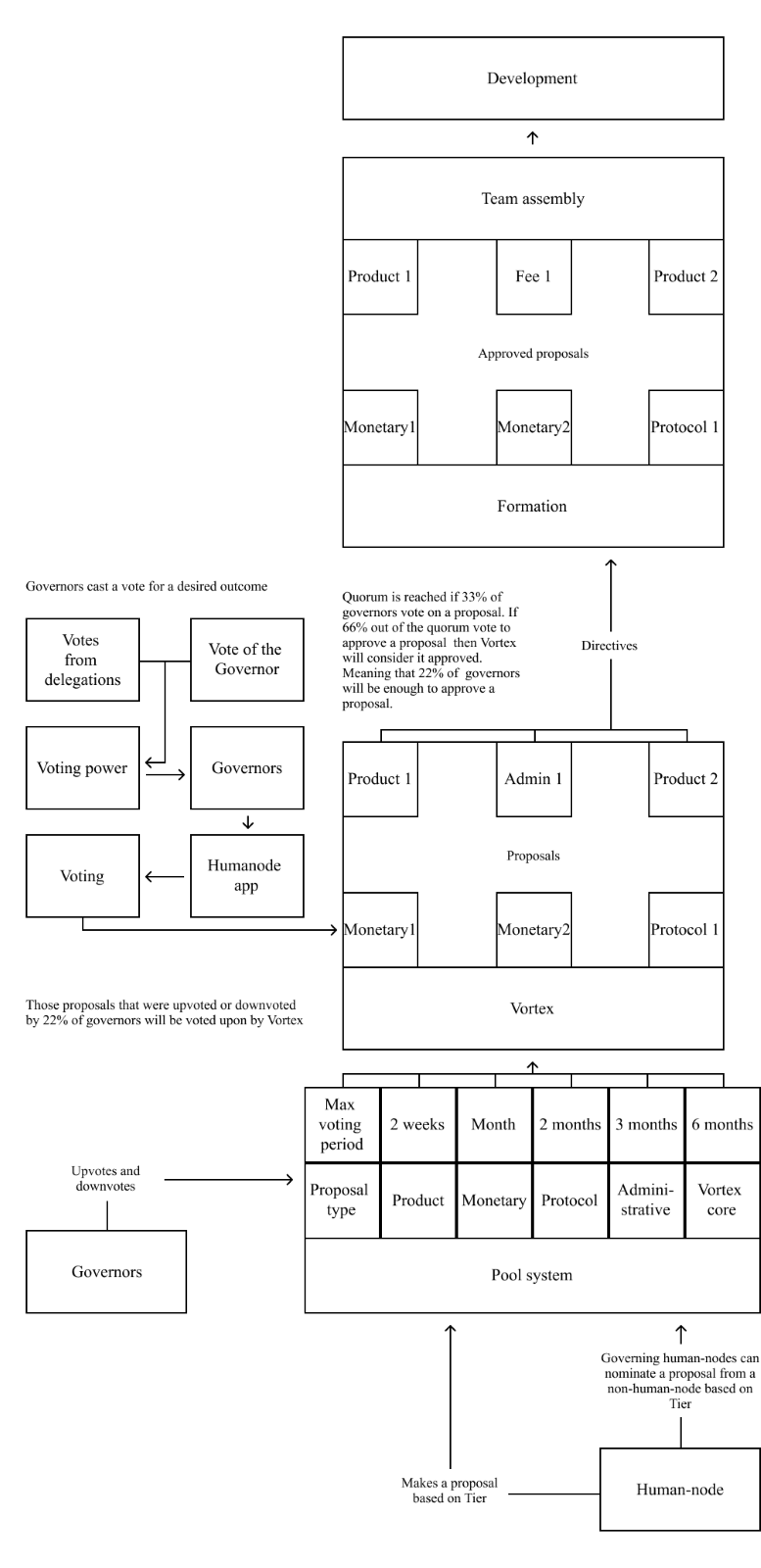Formation: Humanode's special grant-based development program
Humanode is governed by Vortex, a decentralised organization which uses the voting power of equal human nodes to decide on crucial parameters. The execution body of Humanode DAO is called Formation.

The secret sauce of DAOs is that blockchain brings smart contracts — computer code that can be used to automate the management of the organisation according to predefined rules and conditions, which is a step forward from the way humans coordinate prior to web3 and the internet.
Humanode is governed by Vortex, a decentralised organization which uses the voting power of equal human nodes to decide on crucial parameters. The execution body of Humanode DAO is called Formation.

Formation is a one-of-a-kind grant-funded development initiative. Grants, investments, service agreements, and jobs are all available. It's sole purpose is to support the Humanode network and its associated technologies. Successful projects can eventually deliver more value than they were given, producing a positive feedback cycle.
Any human node can make a grant proposal or apply to become a part of a team that already develops an approved proposal, or find team member to execute on approved proposal
Proposals by non-human nodes can only reach Formation if one of the governing human nodes decides to nominate them. Such limitations allow us to protect devoted followers and contributors to the Humanode network by approving proposals that are truly beneficial to the network.
The proposals receive upvotes and downvotes from governors, and once a proposal is approved, it moves forward. Initially, at the genesis of the network, we have set it so that 2% of the fees earned in the system is to be assigned to the Formation, however, as the system evolves, the humanode community will be able to vote, through Vortex, on the percentage of the fees that are to be assigned to the Formation, for further development, grants, investments, projects, and so on.
Formation funding areas
1. Research: Basic and practical research in cryptography, distributed systems, formal verification, economics, and biometrics, among other areas.
2. Development and Product: Development transforms research into software, whereas Product transforms it into user experiences. The organisation is most interested in innovations that will help to extend the Humanode network's potential, capabilities, and security, as well as the ecosystem.
3. Social Good & Community: Formation assists community members in raising awareness of open-source, decentralized, and bio-technologies, as well as scaling community outreach for the Humanode network.
Humanode Improvement Proposals (HIPs)
- Max voting period ranges from 2 weeks to 6 months.
- 6 Categories: Product, Fee distribution, Monetary, Protocol, Administrative, Vortex Core.
Putting together a team
We at Humanode Core recognise the importance of finding and coordinating people who are willing to help the Humanode network grow. That is why we are working on a specific team-assembly mechanism for the Humanode app that will allow people whose proposals have been authorised by Vortex to find motivated experts from the global Humanode community to form their team. All the proposer has to do is send a digital offer to any other human node he believes would be suitable for his initiatives. Their proposal must include the possible member's public address, as well as working objectives and conditions, also a smart contract that secures a portion of the award for that individual. The one who got the proposal approved can choose to share a certain % of the grant to the team member he/she chose.
Slashing
The receivers of the Formation's grant are slashed if they do not fulfil their responsibilities. We feel that establishing a system to prevent and penalise potentially malicious behaviour, as well as to maintain a complete system balance, is critical. As a result, slashing has been used to give a long-term solution while maintaining the system's integrity and longevity. In other words, this is a DAO governance approach that aims to build operational departments within the DAO to work on a given goal, with matched incentives via staking to encourage participation and slashing to penalise disobedience.
Any verification system needs executive tools to ensure the network's consistency, immutability, and governing processes. The credit-cycle employs law enforcement and jails, PoW blacklists mining equipment, PoS slashes staked cryptoassets, and Humanode slashes your biometric identity by temporarily blacklisting your public address associated with your private identity.
If a bad actor tries to harm the network in any manner, the system will blacklist his hash, hence blacklisting his biometrics indirectly. After being slashed, the culprit will be blacklisted for an indefinite amount of time and will be unable to sign any transactions on the Humanode network. The seriousness of the harmful conduct itself determines how long the user is blacklisted. Vortex is notified of any modifications to the severity levels of perpetrators and blacklisting periods. Governors gain proposal rights to amend any slashing criteria once they reach the legate tier.
Conclusion
Many DAOs have governance at their core. DeFi projects, unlike cemented systems like Bitcoin, may require a higher level of granularity in decision-making. It is critical that the decision-making process is clear and appropriately rewarded. Incentives, as well as eliminating friction from the user's perspective and assuring the delivery of information regarding governance proposals to the involved token holder, are all used to encourage engagement in governance. The architecture proposed is intended to relieve the average DAO token holder of day-to-day responsibilities while maintaining governance for specific activities.

